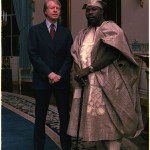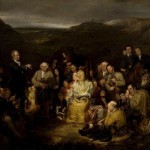Two-kingdom theology is a set of reflections on Christian life that distinguishes between the secular and the religious spheres — for starters — with implications for believers not too closely identifying the cause of Christ with partisan politics. Its roots are in Christ’s instructions about rendering to Caesar (Matt 22:21). But it also draws on Pauline notions about what is temporary and passing away vs. what is eternal and of lasting consequence:
So we do not lose heart. Though our outer self is wasting away, our inner self is being renewed day by day. For this light momentary affliction is preparing for us an eternal weight of glory beyond all comparison, as we look not to the things that are seen but to the things that are unseen. For the things that are seen are transient, but the things that are unseen are eternal. (2 Corinthians 4:16-18 ESV)
Some Protestants object to 2k theology because it seems to produce a political quietism or cowardice that removes Christians from public life. Some also object that it takes away the religious foundations of American society. For instance:
Under the old Puritan-Reformed theology the right to freedom was ultimately guaranteed by God’s Law. The civil magistrate was a minister of God to insure justice as defined by God. This was the root of our civil liberties, not a social contract like the U. S. Constitution whose authors omitted any reference to the God of the Bible. There was a time when the men of God would call to account the civil magistrate when he deviated from his responsibility to uphold God’s Law. It was the duty of every preacher. . . .
What we need today are brave preachers who understand the sovereignty of God over all of life, and not some two-kingdom preachers who appeal to Americanism for civil rights and see Christianity as only dealing with the soul. It is easy to see how bad theology lost America to secular humanism. I believe that the Church is to blame. Americanism is not the same thing as Christianity.
In point of fact, 2k doesn’t require Christians to recede from engagement with the world. It only raises cautions about identifying such engagement with the cause of Christ. We might argue for or against the Affordable Care Act but refuse to make it a matter of gospel fidelity or holiness.
A couple of recent posts from evangelical authors made me wonder if 2k is getting through. Tim Challies understands that what matters most is life beyond career and homemaking:
They say it is only what you do in this life that matters. They say that you need to full-out live your dash, that little line that will someday appear on your gravestone to represent the time between the day you were born into this world and the day you died out of it. And they are right. They are right to a degree.
But Christians know that the dash is deceptive. It is only the beginning. The dash matters a whole lot, and it is so very important that we spend our lives effectively stewarding our gifts, time, talent, energy, and enthusiasm for the good of others and the glory of God. (Hey, someone should write a book about that!) But the dash is just the short opening blip on a much longer line that extends to forever. While our existence has a clear beginning, it has no end. We will live until we die, and then we will live again. We will live until we die, and then we will be more fully alive than we have ever been.
And yet even Christians can slip into living as if this world is all there is, as if there is nothing beyond that short dash. The gospel transforms homemaking precisely because it assures us that we do not need to do and see and have and accomplish everything in this short life. The gospel promises life beyond—a much better, longer, and more fulfilling life.
Meanwhile, Joe Carter offers a mildly 2k perspective on how we view the news in a 24/7 social media environment:
On just about any given day someone in your social media circle is complaining because Pastor X or Organization Y didn’t denounce a comment made by some pastor they have no association with or some politician they would never, ever vote for. In the age of instant media, it’s not enough to simply be our brother’s keeper. Now, we must also be their round-the-clock, always-on-call denunciator too.
The problem is not that we notice pseudo-events or that we occasionally comment on them. The problem is that we evangelicals appear to share the culture’s addiction to pseudo-events and social media outrage. If you’re enaged in the practice every single day or week then you should really ask yourself, Is this incessant focus on daily trivia the best use of my God-given time and energy?
As Christians, we’re expected to take an eternal perspective, viewing events not just in their historical context but also in their eschatological context. But we can’t do that while focusing on the pseudo-events and social media outrages of the last 24 hours. We can’t keep an eye on what is important while we are furiously scripting our reactions to pseudo-events that will be forgotten within a week.
Truly important events are not always captured on the front page of a daily paper or found in your social media feed.
2k may be trending.












